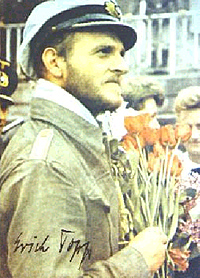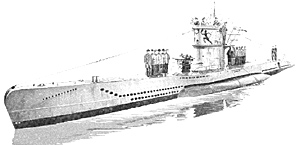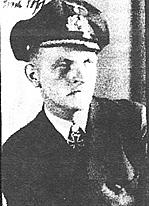 This is the 1994 interview we did with Admiral TOPP, and it is the first time it is published anywhere. You may order a copy of this on videotape. Details on our website.
This is the 1994 interview we did with Admiral TOPP, and it is the first time it is published anywhere. You may order a copy of this on videotape. Details on our website.
SHARKHUNTERS:
Admiral, how did you come to join the Kriegsmarine? Tell us about your early days.
Topp Back from patrol.
Admiral TOPP:
In the Navy first I have passed all the training and the Marine Schüle (the German Naval Academy) at Flensburg/Mürwick and after that, my first duty was on board of a cruiser, the cruiser KALRSRUHE, where I was aide-de-camp to the commanding officer and there I met for the first time then Kapitän Dönitz. The KALRSRUHE was target for submarines in a maneuver and Dönitz was on board of the target and I had to give over my cabin to him, so I came in close contact with him and he told me about submarine tactics and the operating things of submarines. I was fascinated and then he asked me if I would like to join the submarine force and I said, okay, I would like because I have read already many books about submarines and well, half a year later I got the command to join the submarines.
 The light cruiser KARLSRUHE
The light cruiser KARLSRUHE
SHARKHUNTERS:
How long after you first joined the submarine arm did you pass the examination to become a captain of a submarine?
Admiral TOPP:
Well, you know in a normal tour of duty you must first join the submarine school but unfortunately when I joined, there was no place available for me, so I had to do another duty but in 1938, I became I.W.O. on U-46 in the 7th Submarine Flotilla, and that was one year before the war started.
SHARKHUNTERS:
Was that a Type VII U-Boat?
Admiral TOPP:
It was a Type VII, yes.
SHARKHUNTERS:
Then you were commander of a Type II U-Boat after that, right?
Admiral TOPP:
Yes, of a Type II, that’s right.
SHARKHUNTERS:
Tell us about the Type II. Did you like that boat?
Admiral TOPP:
Well, you get of course, familiar with it. It was the smallest boat that we ever have constructed. It has less than 300 tons and compared with a VII-C boat that has more than 700 tons, and it has only three torpedo tubes and so it is limited in its operational capacity. It has a slow speed, both surfaced and
Admiral TOPP:
(continued) submerged and it is very, very small (laughter). There is no Captain’s cabin. We had to stay in the same room as the crew. There was no privilege for the Captain (more laughter).
SHARKHUNTERS:
So you preferred the Type VII?
 U-552: Topp’s Type VII-C with the famous dancing red devils on the tower. One was the devil of life, to bring them back safely. The other was the devil of destruction, which signified their missions.
U-552: Topp’s Type VII-C with the famous dancing red devils on the tower. One was the devil of life, to bring them back safely. The other was the devil of destruction, which signified their missions.
Admiral TOPP:
Well, the Type VII was a little bit better but it was narrow too, claustrophobic. But later on in the last months of the war, I took over the command of a VII Type boat and that of course was bigger and you had more space and there was a Captain’s cabin.
SHARKHUNTERS:
I am very curious what you feel are the essential qualities for a successful U-Boat Skipper.
Admiral TOPP:
That is difficult. I think this question is not easy to be answered. First it is discipline that you have to have on board. That is the most important thing. Then knowledge of everything. You must be familiar with all details on board. You must know personally everybody – you must know his story, you must know his family situation, you must be a father to your boys. That is to my point of view, very important and perhaps I should like to say, you must be able to hide your deficiencies. Everybody has deficiencies. I don’t think there is one man without and you have to hide it so…………you have to wear, to a certain degree, a mask. Not always, but in very difficult situations.
For instance, on our submarine under depth charges, you are walking on a very thin line. On one side is life; on the other side is death. You should not show that you are balancing on this line with great difficulties. Always be on the safe side in the face of your crew.
SHARKHUNTERS:
The world we live in today is a very different world than the late 1930’s. England, Germany, the United States – all of these countries still exist but in many ways, they are very different countries. England was a colonial power as was France, Belgium and they were very brutal in retaining control of their far-flung empires. That is very different from today. Can you explain how it is different from today? For instance, it is difficult for Americans today to understand why there was so much resistance in the United States to become involved in the Second World War but to the average American in 1939, this was just another war between competing empires. Britain had a very rigid class system and it had a far-flung empire, was a world power – it was a different world at that time.
 Formal photo on receiving the Swords to his Knights Cross
Formal photo on receiving the Swords to his Knights Cross
Admiral TOPP:
You have to see the whole history, not only the time before the last war but you also have to see the First World War and the result of the First World War – the Treaty of Versailles. We were suffering under the Treaty of Versailles. That meant we had reduced our forces to 100,000; a part of our country was occupied – especially the Rhineland was occupied, but the most important thing was that we had to deliver contributions; paying, until 1982! Of course, that was a burden that the political part of Germany was not willing to wear and therefore, it was one of the reasons that the National Party started because they said we want to get rid of these constraints and so that was the birth of National Socialism and well, how it came to the Second World War is not easy to be answered. Even among the historians, there are differing opinions. The normal opinion is that Hitler was willing to start the war and that he wanted to get room for his people, but there are others who say even the Polish are not without guilt, having started the war but I cannot give an exact answer.
Anyhow, the war expanded and because Hitler didn’t reach what he wanted, so the war expanded and then it came to the end and of course, now we know all what he intended to do was the wrong course. So when we consider in the wake of the war, the criminal side, hundreds of thousands of killed men not as war actions but behind the front lines, then we must say that it was the wrong path that we went. It was difficult in such short words to give the situation of the war and the beginning of the war, the end of the war, it is not easy to tell that in short words.
I find it impossible to sum up the sense of loss, of disappointment, of bitterness and of despair at the end of the war. The war had consumed all the power, energy and left us nothing but chaos and debris.
This great first-person memory of the war will continue next month in KTB #171, but you may have your own copy of the videotape immediately and see it all. Just order Tape H-50, the 1994 interview with Admiral ERICH TOPP, only $30 each (plus $5 shipping per videotape). They are in stock for fast shipping.
More Adm. Topp
- Interview with Adm. Erich Topp Part 1
Interview with Adm. Erich Topp Part 2
Interview with Adm. Erich Topp Part 3
Interview with Adm. Erich Topp Part 4
Interview with Adm. Erich Topp Part 5
Interview with Adm. Erich Topp Part 6
Back to KTB # 170 Table of Contents
Back to KTB List of Issues
Back to MagWeb Master Magazine List
© Copyright 2003 by Harry Cooper, Sharkhunters International, Inc.
This article appears in MagWeb.com (Magazine Web) on the Internet World Wide Web. Other articles from military history and related magazines are available at http://www.magweb.com
Join Sharkhunters International, Inc.: PO Box 1539, Hernando, FL 34442, ph: 352-637-2917, fax: 352-637-6289, www.sharkhunters.com
